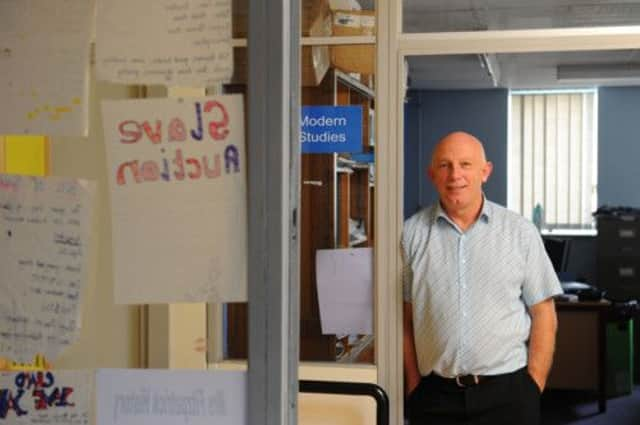Hugh Reilly: In maths, some things don’t add up


The reader will thus understand my discomfort when, recently, on letting slip to a new acquaintance that I was colour-blind, my affliction evoked a tad unsympathetic response. “Really? What colour is my shirt? Maybe I should call you Hue Reilly! Geddit?” he said with a laugh that made a drunken bride-to-be on her hen night in Govan seem the epitome of decorum.
When I was young, my colour-blindness was a cause of much angst, often heightened by the insensitivity of others regarding my less than perfect vision. For example, in a fit of temper, I recall hitting my kindly aunt over the head with the kaleidoscope she’d bought me for Christmas. Growing up in the Sixties, like most boys I dreamed of being an astronaut – I would have been Easterhouse’s first, I believe – but my eyesight issue ensured there would be no “wan sma’ step fur mankind.” My agony intensified when a British Army recruiting team on a visit to my school gently informed me that my colour-blindness would be a source of some anxiety for fellow members of the Bomb Disposal unit. Truth be told, it rankles that others with minor disabilities are given posts for which they are clearly unsuitable. For understandable reasons, it figures that innumeracy would be a barrier to a position in the BetFred organisation. Bizarrely, being at sixes and sevens with integers and quadratic equations is not a problem if one wishes to become a primary school teacher. A Standard Grade award in Mathematics is the entry requirement to pass on one’s limited knowledge of that subject to young learners.
Advertisement
Hide AdAdvertisement
Hide AdWith the Curriculum for Excellence’s focus being on literacy and numeracy, the ubiquitous education, em, “guru”, Keir Bloomer, believes that the entry bar (for the teaching of mathematics) is too low, currently so low that a pygmy limbo-dancer would struggle to clamber under. It does seem incongruous that teacher training colleges demand candidates possess Higher English but accept applicants with only a fraction of the understanding needed to teach maths.
Most primary school teachers are in denial. It’s not necessary to know lots of hard numbers stuff when you are teaching young children, they parrot. Call me picky but the teaching methodology of “being one page ahead of the pupils” has been somewhat discredited by academic research. Subject depth, while admittedly not always utilised on a daily basis, is vital to stretch the young minds of our most able learners.
When I wrote a column some years ago on this same subject, it attracted the attention of females who claimed that insisting on a Maths Higher was a form of indirect discrimination. A self-appointed spokeswoman stated the measure would have a greater impact on female applicants because, wait for it, boys were better than girls at maths. When I helpfully pointed out that around 90 per cent of primary teachers are women, and that any policy that provided a more gender-balanced workforce could only viewed as a positive change, she morphed into a dog barking at its own reflection.
Apologists for the dire levels of maths in the wee school bleat that high-quality nurturing skills outweigh intimate knowledge of Pythagoras or Venn Diagrams. Unfortunately, other countries in the developed world don’t share that paradigm on how to produce the next generation of educated youngsters.
Most opt to recruit the cream of university graduates and reward them accordingly. The Scottish education system, however, takes irony to new frontiers when cuddly “circle time” sessions are hosted by teachers who, for the life of pi, wouldn’t know their radius from their diameter.
If asking for competency in mathematics kills the career hopes of some aspiring primary teachers, so be it. As a nation, we are competing against countries where it is culturally unacceptable to abandon a subject because it is difficult to comprehend. Our wont to glow with inverse pride at being rubbish at maths is one of the reasons why India, China, Brazil and Russia are the so-called “bricks” of the world economy.
I’m browned-off (or maybe greened-off) that we continue to settle for less.